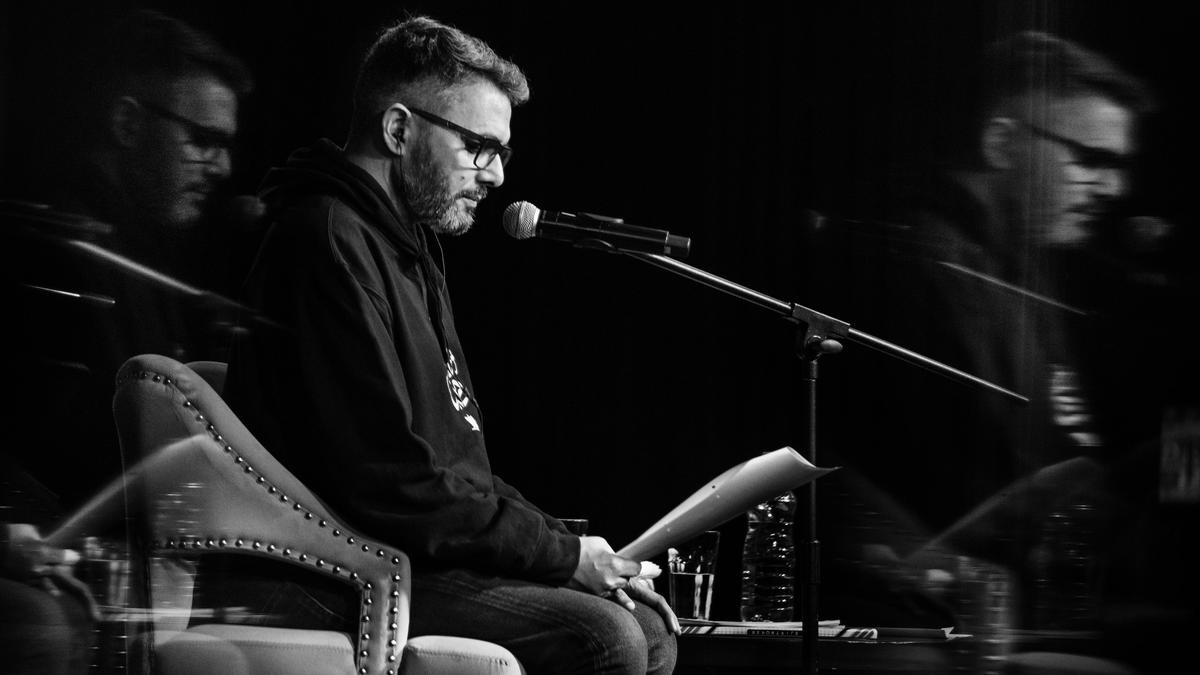
On January 6th, a significant cultural event took place at Ambedkar Bhavan in Bengaluru, marking the debut performance of Neelesh Misra, a man whose versatile career spans journalism, lyricism, authorship, and more. Despite an unanticipated delay of two hours—mercifully not due to the infamous Bengaluru traffic but a flight setback—Misra’s inaugural show in the city was a heartfelt display of storytelling, enhanced by a blend of film and non-film music that he himself penned.
For those who haven’t encountered Neelesh Misra’s work, he is a journalist, has authored five books, is a media entrepreneur, and an influential lyricist known for Hindi film music, including the hit song ‘Jadu hai nasha hai’ from ‘Jism’. He is also recognized as the Editor and co-founder of the Gaon Connection, a rural media platform. Misra’s career has seen him delve into the intricacies of the Kargil War, the depths of insurgency, and the splendours of the Olympics.
In an intimate conversation with Metroplus, Misra reflected upon his extraordinary journey from reporting on insurgency to crafting beloved Bollywood melodies. His professional path has been carved by a passion for storytelling, seeking to capture the essence of humanity across various domains. Misra attributes his success to his empathy, patience, and ability as a keen listener—a rare combination which, he believes, journalists of today often lack. Indeed, Misra is nostalgic for an era in which journalists were the discreet messengers of news, unbiased conduits for information, as opposed to the increasingly common practice where the line between reporting news and becoming part of the story blurs.
Misra’s journalistic experience—the discipline of patient storytelling—is ingrained in his creative process. Anecdotes of interviewing hijack survivors, his attention to minute details, and his commitment to turning these into compelling narratives expressed his approach to both his reporting and his work as a lyricist. What others might overlook, Misra observes and transforms into the most evocative of moments, giving life to characters and scenarios alike with an almost detective-like diligence.
The process of transitioning from fact-based journalism to the imaginative realms of fiction posed its own challenges. Initially approaching fiction with a journalistic framework, Misra found himself exploring and consequently falling for the addictive nature of long-form, creative writing. His dual roles—reporting on one hand and scribbling love songs for Hindi cinema on the other—epitomize the duality that marks his prolific career.
Discussing how inspiration can strike in the most mundane scenarios, Misra narrated the conception of the song ‘Maine Dile Se Kaha’ for the movie ‘Rog’ while he was stuck in a traffic jam in Delhi. It was during this pause in his daily commute that a conversation with the composer MM Keeravani sparked the creative process, leading to the completion of the song by the time Misra reached home. Such instances exemplify how chaos can be a crucible for creativity, with the city’s cacophony giving birth to lyrical serenity.
Another noteworthy chapter in Misra’s life is his involvement with ‘A Band Called Nine’, a music group which stemmed from a somewhat deceptive pitch by Misra, who confesses to not being a trained singer. Yet, it was his narrative prowess that set the band apart, with Misra’s role as a storyteller coming into play and initiating his unique trajectory in performance storytelling.
Misra’s recent engagement in Bengaluru is particularly illustrative of his special connection with his audience. Despite the unexpected late start to his performance, the crowd’s patience was rewarded with an experience that resonated on a personal level, prompting Misra to express his gratitude by offering refunds for the inconvenience. In the aftermath, fans eagerly shared their own life stories, reinforcing the profound personal connections his stories cultivate.
Ultimately, the evening reiterated Misra’s belief in the power of the ordinary, the everyday, and the humble stories that, when crafted with empathy and attention to detail, can unite, heal, and captivate.
In an era increasingly dominated by bombastic headlines and character limits, the humble “postman” approach to journalism that Misra champions reminds audiences of the value found in the quiet observation and celebration of life’s small moments—a trait that has endeared him to followers across mediums and platforms.












